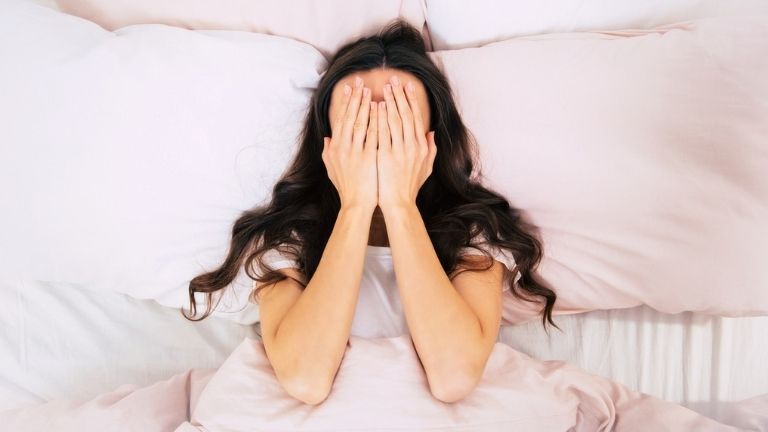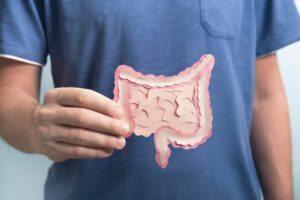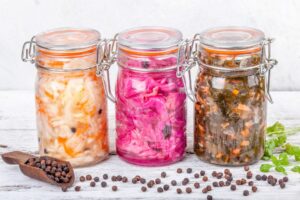How many nights have you spent wondering ‘why can’t I sleep?’ Healthista spoke to Claire Barnes from Bio-Kult who reveals 8 easy lifestyle changes to help with restless sleep
Gut health has a close connection with healthy brain function, now known as the gut-brain axis.
Just as our mood is influenced by the state of our gut microbiome through the gut-brain axis, or ‘microbiota–gut–brain axis’, our sleep also suffers when our gut microbes are out of whack.
The gut connects with the brain through a number of different pathways, including the immune system (via inflammation), the nervous system (via neurotransmitters) and the endocrine system (via hormones).
The gut and brain are also directly linked by the vagus nerve. This is the ‘information highway’ that delivers important information from the gut to the brain (and vice versa) and plays an important role in the maintenance of intestinal and energy homeostasis.
by improving our gut health we could potentially help to support the health of our brain
Interestingly, approximately 80 to 90 per cent of the information sent along the vagus nerve moves upwards, originating in the gut and relaying messages back up to the brain, while only 10 to 20 per cent of the messages are sent from the brain down to the gut.
This intimate connection between the health of our gut and the health of our brain, may suggest that by improving our gut health we could potentially help to support the health of our brain, including improving our sleep.
The microbes which live in our gut (which include bacteria, fungi and viruses) can have an impact on these messages.
An imbalance of the gut microbiome has been linked to various conditions around the body, including our mental health and sleep disturbances and may provide some insight into the question of ‘why can’t I sleep?’
So how do the microbes living in our gut have an effect on our sleep?
Sleep is strongly affected by both external cues (such as sunlight and exercise) and internal cues (such as what and when we eat).
If we’re eating poor quality food (i.e. high sugar, processed foods) and eating at the wrong time of day (such as eating a large meal just before bedtime) this can affect the size, composition and the natural rhythms of our gut microbiome.
Individuals who have a diverse gut microbiome appear to have better sleep and are less likely to experience sleep disturbances.
A recent Japanese study suggests the gut microbiota affects the sleep/wake cycle by altering the intestinal balance of neurotransmitters which then affects the communication between the gut microbiome and sleep regulation in the brain.
Individuals who have a diverse gut microbiome appear to have better sleep
For example, GABA has been shown to promote sleep, and serotonin helps maintain the structure of sleep cycles.
Our sleep-wake cycle is regulated by the pineal gland. It receives and interprets light and darkness signals from the eyes.
Neurotransmitters, such as dopamine, norepinephrine, and serotonin translate these signals into the production of melatonin, a hormone that makes us feel sleepy.
A dopamine rush can stop the effects of norepinephrine and keep us awake. In this case, the pineal gland makes and releases less melatonin, which can cause us to feel restless and amped up even if the body is tired.
8 ways to strengthen your microbiome
We have to be conscious of what we ingest (food, media etc) as it has an effect on our microbiome and our sleep patterns.
Our modern lifestyle (late nights, processed foods, artificial light, stress etc) has many of us completely out of sync with the night-and-day and sleep-wake cycle.
A healthy gut microbiome doesn’t just call for healthy food choices but a more holistic approach to health, reducing stress, light and noise pollution, and making sure our (social) media intake doesn’t leave us high and dry.
#1 Reduce refined carbohydrates
When we eat high-GI foods (e.g. sweets, cakes and biscuits) our blood glucose levels rise rapidly which results in insulin being released to try and bring the blood glucose level back down.
However, if too much insulin is released, other hormones such as adrenaline and cortisol are also released.
also provides a feast for the gut microbiota
This leaves our energy levels out of balance throughout the day and sends very mixed messages to the brain as to whether we’re feeling tired or alert.
Instead, eating a diverse variety of whole foods cooked or prepared from scratch not only provides the nutrients the body needs for energy balance and sleep, but also provides a feast for the gut microbiota helping to create a diverse microbiome which may also help us to sleep better.
#2 Supplement with multi-strain live bacteria
A recent study in 38 healthy volunteers taking a multi-strain probiotic containing both Lactobacillus and Bifidobacterium for six weeks found an improvement in sleep quality and mood and a reduction in depressive mood state, anger, and fatigue.
Bio-Kult Migréa contains 14 different strains of live bacteria, plus magnesium and vitamin B6, both of which can help support our body to produce melatonin (our sleep hormone).
#3 Make your own fermented foods
Fermented foods are a great source of beneficial bacteria. These include live plain yogurt and kefir, fermented vegetables such as sauerkraut, kimchi or pickles, fermented pulses such as dosa and soya bean products including tempeh, miso and tofu, and fermented tea such as kombucha.
if buying from a shop choose sauerkraut and kimchi labelled as ‘raw’
Ideally, we should be making our own fermented foods at home as commercial products can vary greatly in the amount of organisms still present.
However, if buying from a shop choose sauerkraut and kimchi labelled as ‘raw’ and kept in the fridge opposed to those kept on the shelf which will most likely have been pasteurised to extend shelf life so may have lost some of their benefits.
#4 Eat foods rich in prebiotics
Prebiotics are foods the microbiome loves! They are fermentable fibres that our body can’t absorb, but can feed our gut microbes.
Foods high in prebiotics include onions, garlic, oats, slightly green bananas and Jerusalem artichokes. When our gut bacteria ferment these fibres, they produce certain metabolites, predominantly short-chain fatty acids (SCFAs).
Foods high in prebiotics include onions, garlic, oats, slightly green bananas
A recent study in mice revealed that SCFAs peak in concentration at the beginning of the dark period, which suggests these microbial-produced SCFAs influence our own circadian rhythm.
The SCFA butyrate, has been suggested to function as a sleep-inducing signal molecule to enhance sleep, indicating that gut microbes which produce butyrate may influence sleep quality.
#5 Improve sleep hygiene
The link between sleep and the gut microbiome is bidirectional. As well as the microbes in our gut affecting our sleep patterns, a lack of sleep can also disrupt our gut microbiome.
Practising good sleep hygiene each evening could help benefit your sleep as well as your gut microbes.
Aim to get to bed at the same time each night and wake at the same time each morning, use dimmed lighting in the evening and set your screens to night mode.
massaging oil onto your feet just before lying down in bed to help relieve tension
Ensure all screens are fully turned off at least 30 minutes before heading to bed and switch off all the Wi-Fi and mobile devices in the house to reduce the electromagnetic fields (EMF) which could potentially impact sleep.
Ayurvedic practise also recommends massaging oil onto your feet just before lying down in bed to help relieve tension and improve blood circulation, both helping to support a good night’s sleep.
#6 Take digestive enzymes to help your gut break down food
The phrase ‘you are what you eat’ would actually be better expressed as ‘you are what you digest and absorb’.
As well as potentially leading to nutrient insufficiencies, undigested food could also provide a food source for more harmful bacteria leading to gut microbiome imbalances.
A digestive enzyme supplement could be useful for those with digestive symptoms such as bloating, quick transit time, and if taking stomach acid suppressants such as PPIs, in order to help them better digest their food and absorb more nutrients.
enzymes must be in physical contact with the food in order to work for digestive purposes
Certain foods also contain naturally occurring proteolytic digestive enzymes, such as bromelain in pineapple, papain in papaya and sprouted beans and seeds.
Digestive enzymes work on contact with food, so the enzymes must be in physical contact with the food in order to work for digestive purposes. Taking them at the beginning or just before a meal is therefore advisable.
#7 Eat your veggies
We should be aiming to eat at least five portions of vegetables and one or two fruits per day. Additionally, these should come from a rainbow of different coloured vegetables and fruits to increase diversity of the diet.
Eating a rainbow is particularly beneficial as the different colour pigments in fruits and vegetables are an indication of some of the different phytonutrients they contain.
greens are high in folate, indoles and saponins
For example, purple/blue fruit and vegetables contain anthocyanidins, orange and yellow varieties contain carotenoids such as beta-carotene, red ones are high in lycopene, white varieties such as garlic and onions often contain allicin and greens are high in folate, indoles and saponins.
Research also indicates that many of the health benefits associated with eating a diet high in a variety of plant-foods may relate to the positive effect it has on the microbiome.
Individuals who eat a high diversity of plant foods have shown to have a more diverse gut microbiome.
#8 De-stress
Taking time out for yoga, meditation or breathing exercises could help you switch from sympathetic mode (fight or flight) to parasympathetic mode (rest and digest) allowing you to relax and de-stress.
Interestingly, research now suggests that disruptions to the microbiome may be implicated in a number of stress-related conditions including anxiety, depression and irritable bowel syndrome.
Stress itself can also disturb the mixture of bacteria in our gut, reducing the number of beneficial species and potentially contributing to stress-related digestive issues.
disruptions to the microbiome may be implicated in a number of stress-related conditions
A balanced lifestyle could help support your physical, emotional and mental health as well as optimise your gut health.
Start by implementing a five-minute meditation every morning and evening, take a yoga class once or twice a week and make time for yourself to just be, go for a walk, read a fun book and minimise your time online.
More Healthista Content:
Heard of ayurveda? Here’s what it is and how can it help your skin
9 natural insomnia remedies to help you sleep better tonight
Feeling stressed or overwhelmed? Try this quick breathing exercise
3 ways yoga will change your body
Like this article? Sign up to our newsletter to get more articles like this delivered straight to your inbox.



























































